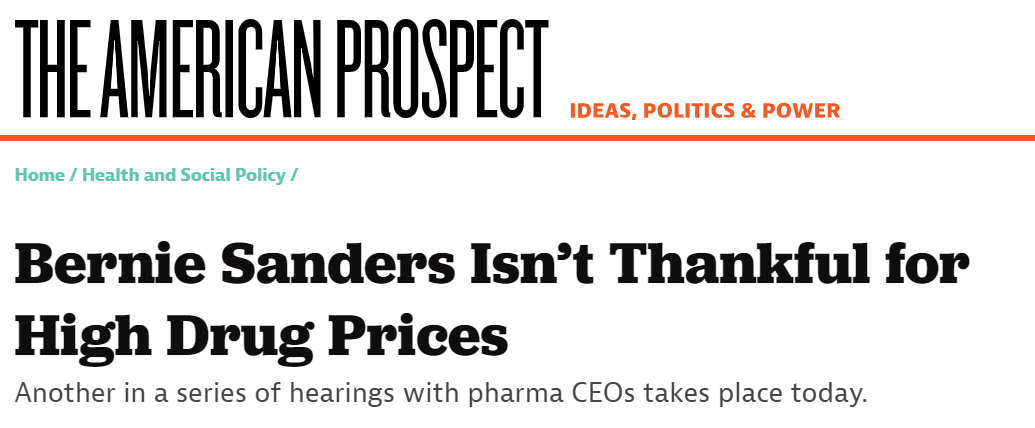Welcome to DU!
The truly grassroots left-of-center political community where regular people, not algorithms, drive the discussions and set the standards.
Join the community:
Create a free account
Support DU (and get rid of ads!):
Become a Star Member
Latest Breaking News
General Discussion
The DU Lounge
All Forums
Issue Forums
Culture Forums
Alliance Forums
Region Forums
Support Forums
Help & Search
General Discussion
Related: Editorials & Other Articles, Issue Forums, Alliance Forums, Region ForumsBernie Sanders Isn't Thankful for High Drug Prices

https://prospect.org/health/2024-02-08-bernie-sanders-congress-high-drug-prices/

Sen. Bernie Sanders (I-VT) speaks during a news conference on the Senate HELP Committee’s subpoenas of pharmaceutical company representatives to discuss drug prices, January 25, 2024, at the Capitol in Washington.
Today, CEOs for Johnson & Johnson, Bristol Myers Squibb, and Merck, three of the world’s biggest pharmaceutical companies, testify before the Senate Health, Education, Labor and Pensions (HELP) Committee, chaired by Sen. Bernie Sanders (I-VT). The CEOs are likely to defend themselves from public outrage over the exorbitant cost of prescription drugs, which has made them and their companies fabulously rich. They will probably not be as blunt as a recent Wall Street Journal op-ed on the subject, which had the headline “Be Thankful for High Drug Prices.” “It’s funny you mention that, I was thinking about it five minutes ago,” Sanders told me with a laugh, in an interview to preview the hearing. “I thought maybe I will send that op-ed to the hundreds of people who have communicated with us, whose spouses have died, family members have died, because they couldn’t afford prescription drugs.”
The argument in the Journal op-ed is a familiar one from defenders of the pharmaceutical industry, which, as Sanders’s committee notes in a pre-hearing report, saw its ten leading companies earn over $112 billion in profits in 2022 alone. Both the op-ed and the Sanders HELP Committee report note that Merck has earned more from its cancer drug Keytruda in the U.S. ($43.4 billion since 2015) than it has in every other nation combined ($30 billion). This imbalance is also true of top drugs from Johnson & Johnson (Stelara) and Bristol Myers Squibb (Eliquis). But op-ed authors David Henderson and Charles Hooper, respectively, a Hoover Institution fellow and the head of a business consulting firm with dozens of pharmaceutical clients, claim that since the rest of the world is free-riding on U.S. drug development, U.S. patients simply have to fund the research that goes into developing lifesaving treatments.

In other words, the fact that Americans pay the highest prices in the world for prescription drugs, often three times or more than the residents of other industrialized countries, is just a necessary expense for innovation, and reducing prices would destroy the industry. “Suck it up” would be a good summary of their case. Sen. Sanders has a different view. He noted that Johnson & Johnson and Bristol Myers Squibb, two of the companies participating in today’s hearing, spent more on stock buybacks, dividends, and executive compensation in 2022 than on research and development. Moreover, their innovation often goes to “me-too drugs,” where, as Sanders said, “they are trying to make minor alterations to get another patent and maintain their monopoly.” Indeed, the HELP Committee report found that Merck put 168 different patents on Keytruda, 64 percent of them after it received FDA approval. These “patent thickets” are designed to extend the exclusivity period.
Two of the three drugs in the crosshairs of Sanders’s investigation—Johnson & Johnson’s Stelara and Bristol Myers Squibb’s Eliquis—are among the first ten drugs selected by the Centers for Medicare & Medicaid Services (CMS) for price negotiation in Medicare. Both companies have filed suit against the U.S. to block the price negotiation, which is the crown jewel of the drug reforms in the Inflation Reduction Act. Other reforms for Medicare beneficiaries include a cap on out-of-pocket drug costs (down to $3,300 this year and $2,000 in 2025), a $35-per-month cap on insulin, and a rebate from drug companies on price increases that exceed the rate of inflation.
snip
InfoView thread info, including edit history
TrashPut this thread in your Trash Can (My DU » Trash Can)
BookmarkAdd this thread to your Bookmarks (My DU » Bookmarks)
1 replies, 221 views
ShareGet links to this post and/or share on social media
AlertAlert this post for a rule violation
PowersThere are no powers you can use on this post
EditCannot edit other people's posts
ReplyReply to this post
EditCannot edit other people's posts
Rec (4)
ReplyReply to this post
1 replies
 = new reply since forum marked as read
Highlight:
NoneDon't highlight anything
5 newestHighlight 5 most recent replies
= new reply since forum marked as read
Highlight:
NoneDon't highlight anything
5 newestHighlight 5 most recent replies
Bernie Sanders Isn't Thankful for High Drug Prices (Original Post)
Celerity
Feb 2024
OP
Walleye
(31,455 posts)1. I wonder when they say Medicare beneficiaries are they talking about a Medicare drug plan. Or straight Medicare?